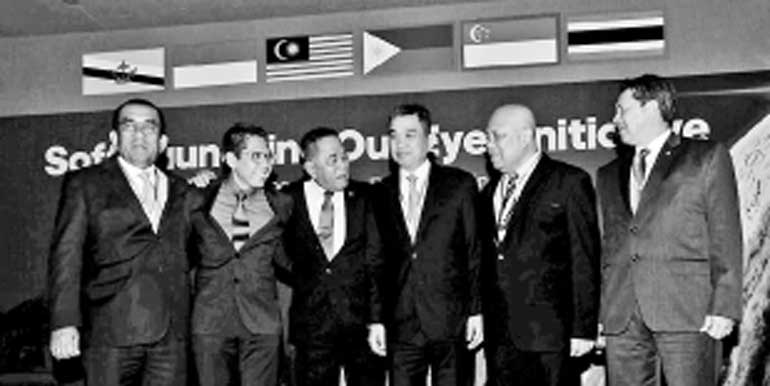Saturday Feb 21, 2026
Saturday Feb 21, 2026
Saturday, 27 January 2018 00:00 - - {{hitsCtrl.values.hits}}

Deputy Defence Minister of Malaysia Mohd Johari Baharum, Singapore Defence Minister Mohamad Maliki Osman, Indonesia Defence Minister Ryamizard Ryacudu, Deputy Defence Minister of Brunei Darussalam Abdul Aziz bin Haji Mohd Tamit, Deputy Defence Minister of the Philippines Cesar B Yano, Deputy Defence Minister of Thailand Chaichan Cangmonkol pose for journalists during the "Our Eyes" meeting in Nusa Dua, Bali, Indonesia, -Antara Foto/Satya Bati/
via REUTERS
JAKARTA/NUSA DUA, Indonesia (Reuters): Six Southeast Asian nations launched an intelligence pact on Thursday aimed at combating Islamist militants and improving co-operation on security threats, overcoming what analysts described as a high level of distrust.
Under the “Our Eyes” initiative, senior defence officials will meet every two weeks to swap information on militant groups and develop a common database of violent extremists.
The intelligence sharing arrangement comes after insurgents aligned to Islamic State laid siege to the southern Philippine city of Marawi last year.
Dozens of foreigners - most notably Indonesians and Malaysians – were among hundreds of militants who seized large parts of Marawi and engaged in a ferocious battle with Philippine forces that left much of the city in ruins and more than 1,100 people dead, according to government figures.
Some of the foreign fighters are believed to have travelled to Marawi via the porous maritime borders of the Sulu Sea, next to Indonesia, Malaysia and the Philippines.
“This is something that seems so simple, but the effect is extraordinary,” said Indonesian Defence Minister Ryamizard Ryacudu at the “soft launch” in Bali.
Ryacudu said intelligence sharing would help ensure another incident like Marawi did not occur and prevent the region from “becoming like the Middle East”.
He added that the intelligence sharing was “specifically for (combating) terrorism and radicalism”.
While led by military forces, the intelligence sharing would “involve all parties”, including police, he said.
Along with Indonesia, Malaysia, the Philippines, Singapore, Thailand and Brunei - all members of the Association of Southeast Asian Nations - have signed up to the pact.
“It’s a significant development,” said John Blaxland, an intelligence analyst from the Australian National University.
“ASEAN has long struggled with getting beyond superficiality when it comes to collaboration on security matters.” Blaxland said relations among ASEAN states had been bedevilled by a “high level of distrust” around intelligence cooperations.
“Operational imperatives are overcoming that and you are seeing that come to fruition with this mechanism.”
Another security analyst, who declined to be named, said a “pact was better than not having a pact” but added that entrenched mistrust between nations, and between different counter-terrorism agencies within nations, had to be overcome for it to be effective.
Ryacudu said other nations could be invited to join the “Our Eyes” intelligence network, whose name is inspired by the Five Eyes long-standing intelligence pact between the United States, Britain, Australia, New Zealand and Canada.
As well as other ASEAN nations, Ryacudu identified the United States, Australia and Japan as possible future members.
“Before joining, they will monitor first,” he said.
Ryacudu asked for assistance when he met US Defence Secretary Jim Mattis on Tuesday in Jakarta.
“General Mattis said that he would help,” he said. “I am very glad because, after all, the US has more sophisticated equipment.”
Bali itself was the target of Islamist militant bombings in 2002 in which 202 people were killed, including 88 Australians.